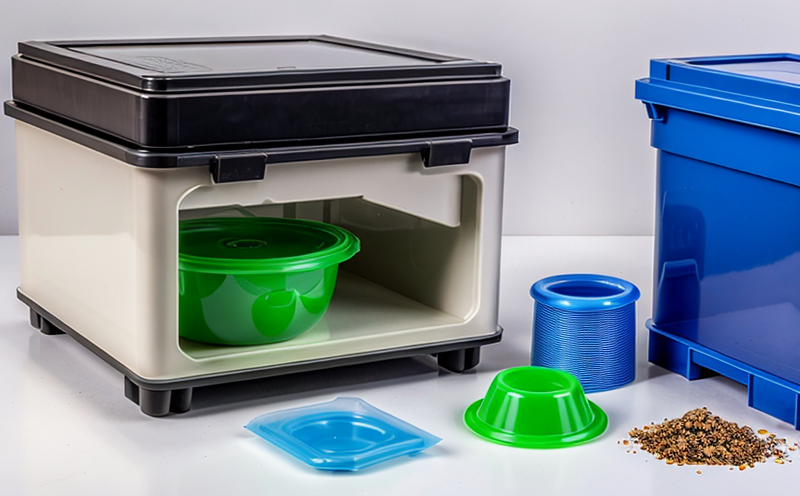ISO 306 Vicat Softening Temperature Testing for Plastics Packaging
The ISO 306 Vicat softening temperature test is a critical method used to determine the thermal performance of plastics and packaging materials. This testing procedure measures the temperature at which a given plastic sample begins to soften under specific conditions, providing valuable insights into the material's suitability for various applications.
This test follows the ISO 306 standard, which specifies the method for determining the Vicat softening point of rigid plastics by means of a standard needle. The Vicat softening temperature is an essential parameter in quality control and compliance with industry standards. It helps manufacturers ensure that their products will perform reliably under expected environmental conditions.
The test involves placing a sample on a rigid support and subjecting it to a standard needle at a defined load. As the temperature increases, the needle penetrates the sample until it reaches a specified depth. The temperature at which this occurs is recorded as the Vicat softening temperature. This method is particularly useful for packaging materials that may be exposed to varying temperatures during storage or use.
The procedure involves precise specimen preparation and conditioning to ensure accurate results. Samples should be conditioned in accordance with relevant standards, typically at a specific temperature and humidity level before testing. The test apparatus must meet the requirements of ISO 306, ensuring consistent and reliable measurements across different laboratories.
Understanding the Vicat softening temperature is crucial for several reasons. Firstly, it provides critical information about how materials will behave under heat, which is essential in packaging design to ensure safety and functionality. Secondly, this test helps manufacturers meet regulatory requirements by confirming that their products adhere to specified standards. Finally, it aids in optimizing production processes and improving material selection.
In summary, the ISO 306 Vicat softening temperature test is a vital tool for assessing the thermal properties of plastics used in packaging applications. By providing accurate data on how materials respond to heat, this testing method supports informed decision-making in manufacturing, quality control, and regulatory compliance.
Why It Matters
The ISO 306 Vicat softening temperature test is essential for ensuring the safety and performance of packaging materials. Here’s why this test matters:
It helps identify the maximum temperature at which a plastic sample can be used without deformation, ensuring product integrity.
By determining the Vicat softening point, it aids in selecting appropriate materials for specific packaging applications.
The test ensures compliance with international standards and regulations, enhancing brand reputation and consumer trust.
It supports the optimization of production processes by providing valuable data on material behavior under heat.
Understanding these factors is crucial for maintaining high-quality packaging that can withstand various environmental conditions without compromising safety or performance.
Why Choose This Test
The ISO 306 Vicat softening temperature test is widely recognized and standardized, ensuring consistent results across laboratories.
This method provides a reliable measure of a plastic’s thermal stability, which is essential for packaging design.
The test supports compliance with international standards and regulatory requirements, reducing the risk of non-conformance.
It offers valuable insights into material performance under heat conditions, aiding in process optimization and quality assurance.
Selecting this test ensures that you are using a robust and validated method to assess packaging materials accurately. This approach helps maintain product integrity and meets industry expectations for reliability and safety.
Customer Impact and Satisfaction
Satisfied customers know that they are receiving products that meet stringent quality standards, enhancing their brand’s reputation.
Regulatory compliance is assured, reducing the risk of product recalls or non-conformance issues.
Manufacturers can optimize production processes, leading to cost savings and improved efficiency.
The test results provide confidence in the performance of packaging materials under various conditions, fostering trust between suppliers and customers.
A satisfied customer base is crucial for long-term business success. By ensuring that your products meet rigorous testing standards, you demonstrate a commitment to quality and reliability, which ultimately leads to greater customer satisfaction and loyalty.





